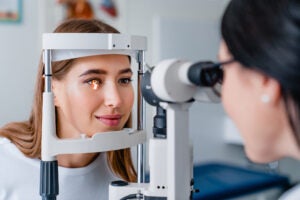Diagnosing and Treating Glaucoma
 Did you know that glaucoma is the second leading cause of blindness worldwide? It affects about three million adults in the United States alone, and glaucoma symptoms are often not apparent to the patient until the disease has advanced significantly. Because there’s no cure for glaucoma, it’s important to see your doctor for regular screenings. These catch the symptoms of glaucoma that you may not have noticed, so that your doctor can stop its progression with the right glaucoma treatment.
Did you know that glaucoma is the second leading cause of blindness worldwide? It affects about three million adults in the United States alone, and glaucoma symptoms are often not apparent to the patient until the disease has advanced significantly. Because there’s no cure for glaucoma, it’s important to see your doctor for regular screenings. These catch the symptoms of glaucoma that you may not have noticed, so that your doctor can stop its progression with the right glaucoma treatment.
What is glaucoma? A condition that happens because of an accumulation of pressure in the eye, glaucoma damages blood vessels at the back of the eye, interfering with the ability of the eye and brain to communicate. Causes of glaucoma are not entirely clear, but there are certain risk factors that increase your likelihood of developing this condition. These include advancing age, eye injury or poor eyesight, African, Asian, or Hispanic ethnicity, family history, the use of corticosteroid medications, thin corneas, and other health conditions like high blood pressure, heart disease, diabetes, and Sickle Cell Anemia. If you have any of these risk factors, it is crucial that you see an eye doctor regularly to check for warning signs of glaucoma. Glaucoma typically develops slowly, over the course of many months or even years, but in some rare cases, it can escalate quickly and cause damage rapidly. Vision loss from glaucoma is irreversible, so prompt diagnosis and treatment are vital.
Glaucoma is most often diagnosed at a routine comprehensive eye exam. During your exam, your eye doctor will check your eyes using several different tests, including tonometry to check the pressure, dilation, and imaging to test for optic nerve damage, a visual field test to determine areas of vision loss, pachymetry to measure corneal thickness, and gonioscopy to inspect the drainage angle. Even though people often do not notice glaucoma until it advances, it’s important to know the signs and symptoms so that you can know when to seek a diagnosis. If you have the most common type of glaucoma, open angle glaucoma, which develops slowly, the signs include:
- Loss of peripheral vision
- Blurred vision
- Halos or rainbow-colored circles around lights
Rarely, people develop closed-angle glaucoma, also called angle-closure glaucoma, which requires immediate medical attention.
- Severe eye pain
- Nausea and vomiting
- Red eyes
- Headaches or migraines
- Blurred vision
Treatment for glaucoma typically begins with eye drops. There are different types of eye drops designed to reduce pressure in your eyes, and you may need to try a few to find what works best for you. If drops don’t work, your doctor will probably switch you to oral medication, which is often the first line of treatment for acute angle-closure glaucoma. Other glaucoma treatment options include laser therapy, filtering surgery, drainage tubes, and minimally invasive glaucoma surgery (MIGS). Since glaucoma has no cure, all of these treatments are designed to lessen the severity of the disease and slow its progression. Catching it early is important for successful treatment, which is why it’s important to see your eye doctor regularly.
If you’re looking for an ophthalmologist or optometrist in Derry, Londonderry, or Windham, Spindel Eye Associates is here for you. Having spent over 35 years providing eye care in New Hampshire, we proudly provide our patients with personalized eye care, using top of the line technology. For more information or to schedule an appointment call 603.421.6536 or contact us through our website.
RECENT POSTS
categories
- Uncategorized
- Eye Exams
- Lasik
- Spindel Eye Reviews
- Cataracts
- Dry Eyes
- Refractive Errors
- Infographic
- Glaucoma
- Macular Degeneration
- Ocular Diseases
- Pulsed Light Therapy
- IPL
- eye care
- eye health
- Eye irritation
- Eye Syndrome
- Eye Doctors
- Diabetes
- Contacts
- LASIK Surgery
- dry eye syndrome Manchester
- Glasses
- Vision Care
- LipiFlow
- Contact Lenses
- Astigmatism
- Crizal Prevencia
- Spindel Eye
- Children
- skin cancer
- Sunglasses
- Eye Disease
